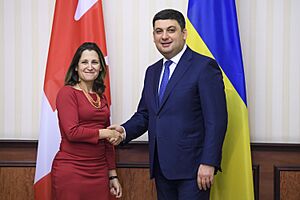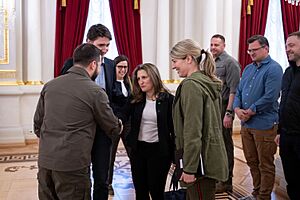Chrystia Freeland facts for kids
Quick facts for kids
Chrystia Freeland
|
|||||||||||||||||||||||||||||||||||
|---|---|---|---|---|---|---|---|---|---|---|---|---|---|---|---|---|---|---|---|---|---|---|---|---|---|---|---|---|---|---|---|---|---|---|---|
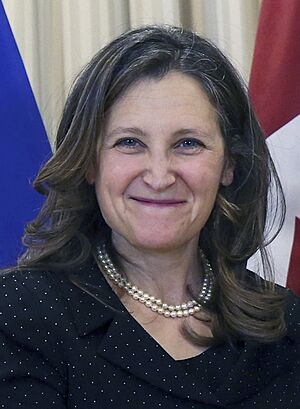
Freeland in 2023
|
|||||||||||||||||||||||||||||||||||
| Minister of Transport and Internal Trade | |||||||||||||||||||||||||||||||||||
| Assumed office March 14, 2025 |
|||||||||||||||||||||||||||||||||||
| Prime Minister | Mark Carney | ||||||||||||||||||||||||||||||||||
| Preceded by | Anita Anand | ||||||||||||||||||||||||||||||||||
| 10th Deputy Prime Minister of Canada | |||||||||||||||||||||||||||||||||||
| In office November 20, 2019 – December 16, 2024 |
|||||||||||||||||||||||||||||||||||
| Prime Minister | Justin Trudeau | ||||||||||||||||||||||||||||||||||
| Preceded by | Anne McLellan | ||||||||||||||||||||||||||||||||||
| Succeeded by | Vacant | ||||||||||||||||||||||||||||||||||
| Minister of Finance | |||||||||||||||||||||||||||||||||||
| In office August 18, 2020 – December 16, 2024 |
|||||||||||||||||||||||||||||||||||
| Prime Minister | Justin Trudeau | ||||||||||||||||||||||||||||||||||
| Preceded by | Bill Morneau | ||||||||||||||||||||||||||||||||||
| Succeeded by | Dominic LeBlanc | ||||||||||||||||||||||||||||||||||
| Member of Parliament for University—Rosedale |
|||||||||||||||||||||||||||||||||||
| Assumed office October 19, 2015 |
|||||||||||||||||||||||||||||||||||
| Preceded by | Riding established | ||||||||||||||||||||||||||||||||||
| Member of Parliament for Toronto Centre |
|||||||||||||||||||||||||||||||||||
| In office November 24, 2013 – October 19, 2015 |
|||||||||||||||||||||||||||||||||||
| Preceded by | Bob Rae | ||||||||||||||||||||||||||||||||||
| Succeeded by | Bill Morneau | ||||||||||||||||||||||||||||||||||
|
|||||||||||||||||||||||||||||||||||
| Personal details | |||||||||||||||||||||||||||||||||||
| Born |
Christina Alexandra Freeland
August 2, 1968 Peace River, Alberta, Canada |
||||||||||||||||||||||||||||||||||
| Political party | Liberal | ||||||||||||||||||||||||||||||||||
| Spouse | Graham Bowley | ||||||||||||||||||||||||||||||||||
| Children | 3 | ||||||||||||||||||||||||||||||||||
| Relatives |
|
||||||||||||||||||||||||||||||||||
| Residences | Summerhill, Toronto, Ontario | ||||||||||||||||||||||||||||||||||
| Alma mater | |||||||||||||||||||||||||||||||||||
| Occupation |
|
||||||||||||||||||||||||||||||||||
| Awards | Rhodes Scholarship (1993) | ||||||||||||||||||||||||||||||||||
Christina Alexandra Freeland (born August 2, 1968) is a Canadian politician and journalist. She has been a Member of Parliament (MP) for University—Rosedale since 2015. Since March 2025, she has served as the Minister of Transport and Minister of Internal Trade.
Before her current roles, Ms. Freeland was the 10th Deputy Prime Minister of Canada from 2019 to 2024. She also served as Minister of Finance from 2020 until December 2024. A member of the Liberal Party, she was first elected to the House of Commons in 2013.
Before entering politics, Ms. Freeland worked as a journalist in Ukraine and held important editorial jobs at major news organizations like the Financial Times and Reuters. She also wrote two books: Sale of the Century: Russia's Wild Ride from Communism to Capitalism (2000) and Plutocrats: The Rise of the New Global Super Rich and the Fall of Everyone Else (2012).
After being elected as an MP, she became the Minister of International Trade in 2015. In this role, Canada negotiated important trade deals like the Canada–United States–Mexico Agreement (CUSMA) and the Comprehensive Economic and Trade Agreement (CETA) with the European Union. Her success led to her promotion to Minister of Foreign Affairs in 2017.
After the 2019 election, she became Deputy Prime Minister and Minister of Intergovernmental Affairs. In 2020, she was appointed Finance Minister, becoming the first woman to hold this position. She introduced a national child care program in 2021 during the COVID-19 pandemic. In 2022, she was involved in the government's response to the Canada convoy protest. She also played a key role in Canada's response to the Russo-Ukrainian War, including putting sanctions on Russia.
On December 16, 2024, Ms. Freeland resigned from the government due to disagreements with then-Prime Minister Justin Trudeau. Her resignation led to a major change in the government and eventually to Mr. Trudeau's resignation as prime minister. In January 2025, she ran for the leadership of the Liberal Party but placed second. She was then appointed to her current roles in March 2025.
Contents
Early Life and Education
Chrystia Freeland was born in Peace River, Alberta, on August 2, 1968. Her father, Donald Freeland, was a farmer and lawyer. Her mother, Halyna Chomiak, was also a lawyer and ran for a political party called the New Democratic Party (NDP). Her parents divorced when she was nine.
Student Activism in Ukraine
Ms. Freeland was an active student from a young age. She attended Old Scona Academic High School in Edmonton and then the United World College of the Adriatic in Italy. She studied Russian history and literature at Harvard University.
During 1988–89, she was an exchange student in Soviet Ukraine. There, she studied Ukrainian, which she speaks fluently. She worked with a journalist to uncover a mass grave site where the Soviet secret police had buried many people. The Soviet government claimed the Nazis were responsible, but Ms. Freeland helped show that it was actually due to Soviet actions.
Her activism caught the attention of the KGB, the Soviet secret police. They watched her and tapped her phone calls. She helped Ukrainian activists by delivering money and equipment. She also worked with foreign journalists to share stories about life in the Soviet Union. In March 1989, she was not allowed back into the Soviet Union. The KGB even wrote a report about how much impact one determined person could have.
After her time in Ukraine, Ms. Freeland interned for a news agency in London. She then earned a Master's degree in Slavonic studies from the University of Oxford in 1993 as a Rhodes Scholar.
Journalism Career
Ms. Freeland started her journalism career in Ukraine, writing for newspapers like the Financial Times and The Washington Post. She later worked for the Financial Times in London as an editor. She also served as their bureau chief in Moscow and a correspondent in Eastern Europe.
From 1999 to 2001, she was a deputy editor at The Globe and Mail. She also worked at Thomson Reuters, where she was a managing director and editor of consumer news. She was a weekly columnist for The Globe and Mail as well.
Writing Books
Ms. Freeland has written two books. Her first book, Sale of the Century: Russia's Wild Ride from Communism to Capitalism (2000), tells the story of how Russia changed from communism to capitalism. It is based on her interviews with Russian business leaders.
Her second book, Plutocrats: The Rise of the New Global Super-Rich and the Fall of Everyone Else (2012), became a New York Times bestseller. It won the 2013 Lionel Gelber Prize and the 2013 National Business Book Award. This book explores how a new group of very wealthy people has emerged globally.
Political Career
On July 26, 2013, Ms. Freeland left journalism to enter politics. She ran for the Liberal Party in Toronto Centre and won the election in November 2013.
In March 2014, during the annexation of Crimea by Russia, Ms. Freeland visited Ukraine. She met with community leaders and government officials in Kyiv. She was one of thirteen Canadians banned from traveling to Russia by Russian President Vladimir Putin. She responded on Twitter, saying it was an "honour" to be on Putin's sanction list.
In the 2015 federal election, she ran in the new riding of University—Rosedale and won with 50 percent of the vote.
Minister of International Trade (2015–2017)
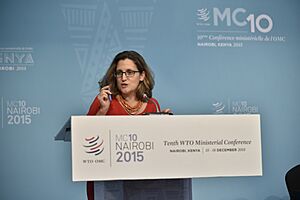
On November 4, 2015, Prime Minister Justin Trudeau appointed Ms. Freeland as Minister of International Trade. She played a key role in negotiating the Comprehensive Economic and Trade Agreement (CETA) between Canada and the European Union. This was Canada's largest trade deal since NAFTA and was signed on October 30, 2016.
Minister of Foreign Affairs (2017–2019)
In January 2017, Ms. Freeland became Minister of Foreign Affairs. She announced that Canada's military training mission in Ukraine would be extended.
She spoke out against the persecution of Rohingya Muslims in Myanmar, calling it "ethnic cleansing." In August 2018, she expressed Canada's concern over the arrest of a human rights activist in Saudi Arabia. In response, Saudi Arabia expelled Canada's ambassador and froze trade. Ms. Freeland also raised concerns about human rights abuses against the Uyghurs in China.
In January 2019, Canada granted asylum to a Saudi teenager fleeing her family, and Ms. Freeland personally greeted her. She also condemned Venezuelan president Nicolás Maduro, stating he had "seized power through fraudulent and anti-democratic elections." In October 2019, Ms. Freeland condemned the Turkish invasion of Kurdish areas in Syria.
Deputy Prime Minister (2019–2024)
After the 2019 federal election, Ms. Freeland was appointed Deputy Prime Minister and Minister of Intergovernmental Affairs. In these roles, she was responsible for important parts of Mr. Trudeau's domestic policy. This included strengthening Medicare, working on Canada's climate strategy, and developing a national child care system. She also focused on improving relations between the federal government and western provinces.
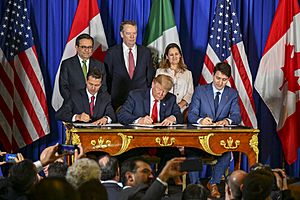
She continued to manage Canada–United States relations, including the approval of the new trade agreement with the United States and Mexico (CUSMA). This agreement was approved in March 2020, at the start of the COVID-19 pandemic. In August 2020, Ms. Freeland was appointed Minister of Finance.
Handling Intergovernmental Affairs (2019–2020)
As Minister of Intergovernmental Affairs, Ms. Freeland handled issues like western alienation, especially in Alberta and Saskatchewan. She also chaired the Cabinet committee on the federal response to COVID-19. During the pandemic, she worked closely with the Premier of Ontario, Doug Ford.
Finance Minister (2020–2024)
Ms. Freeland became Minister of Finance in August 2020, becoming the first woman to hold this position. She presented her first federal budget in April 2021, which included plans for a national child care program. The federal government proposed to cover half the costs, with provinces covering the other half.
In February 2022, Prime Minister Trudeau used the Emergencies Act to end the Canada convoy protest in Ottawa. As Finance Minister, Ms. Freeland worked with police and banks to stop financial services to those involved. She later stated that she took "personal responsibility" for the decision to use the Act.
As Finance Minister, Ms. Freeland introduced programs like the First Home Savings Account to help make housing more affordable. She also implemented a digital services tax on large global digital companies.
In response to a question about rising costs, she suggested Canadians could "cut that Disney+ subscription." She later apologized for this comment.
Ms. Freeland was a leading voice in Canada's response to the Russian invasion of Ukraine in February 2022. She called for sanctions on Russia's central bank and spoke regularly with the Ukrainian Prime Minister.
Resignation from the 29th Ministry
On December 16, 2024, Ms. Freeland resigned from Mr. Trudeau's government. She stated that she had disagreements with him on policy matters, including tax breaks and tariffs. Her resignation caused a major political event in Canada, leading to calls for a vote of no confidence and eventually Mr. Trudeau's resignation as prime minister in January 2025.
2025 Leadership Campaign
On January 17, 2025, Ms. Freeland announced she would run in the 2025 Liberal Party of Canada leadership election. During her campaign, a government task force reported that a social media campaign linked to China targeted her. She received support from many Liberal politicians. She placed second in the election, behind Mark Carney, who became the new leader.
Minister of Transport and Internal Trade
On March 14, 2025, Ms. Freeland was appointed Minister of Transport and Internal Trade in Mark Carney's new government.
Views
Ms. Freeland describes her political beliefs as "simply Canadian" and also feminist. She supports economic policies that are generally in the middle ground and believes in a liberal internationalist approach to foreign policy.
Economics
During her 2025 Liberal leadership campaign, Ms. Freeland suggested changing the carbon tax system. She also proposed capping profit margins on essential goods and making "shrinkflation" illegal.
The "New Plutocracy"
In an article for The Atlantic, Ms. Freeland discussed how the very wealthy, or "plutocrats," are becoming a global community. She explained that these individuals, often with new wealth, live very different lives from the middle and working classes. She believes they see themselves as deserving winners of a tough global economic competition.
She argues that this rise of plutocracy is due to advances in technology and the growth of free trade. While free trade has helped developing countries, it has also increased income inequality in many places. She notes that corporations benefit from expanded access to workers, customers, and money globally.
Ms. Freeland also suggests that wealthy people use philanthropy, or giving to charity, not just for good deeds but also to gain social acceptance. She points out that many wealthy individuals are creating private foundations and think tanks.
She believes that the "new plutocracy" is forming a global community, with stronger ties to each other than to their own countries.
American Agriculture and Family Farming
In another article for The Atlantic, Ms. Freeland wrote that the growth in family farming in the United States offers lessons for the economy. She said that new technology and global trade have helped this industry grow. She noted that rising prices for crops like corn and soybeans are due to the growing middle class around the world. This shows that globalization can help sustain the middle class, not just benefit large corporations.
Central Banking's Role in the Great Recession
Ms. Freeland has praised central bankers like Ben Bernanke and Mario Draghi for helping the economy after the Great Recession. However, she also warned that it is difficult for central banks to stop pumping money into the economy without risking another recession.
Foreign Policy
In 2025, she proposed that Canada should spend 2% of its GDP on defense by 2027. This is the target set by NATO. She suggested this would involve enlarging the military and increasing troop wages.
Social Media, Protests, and Revolutions
In an article for The Atlantic, Ms. Freeland discussed how social media platforms like Twitter can quickly start revolutions, especially in countries with strict governments. However, she argued that these movements sometimes lose out to more extreme groups. She believes that traditional revolutionary movements, like the Bolsheviks, were more organized and had a clear plan for governing.
Family and Personal Life
Ms. Freeland is married to Graham Bowley, a British writer and reporter. They have three children. She has lived in Toronto since 2013. She speaks Ukrainian at home with her children, and also speaks English, Russian, Italian, and French.
Her son's godfather is Mark Carney, who ran against her in the 2025 Liberal Party leadership election.
Ancestry
Ms. Freeland's paternal grandfather, Wilbur Freeland, was a farmer and lawyer. Her paternal grandmother, Helen Caulfield, was a Scottish war bride.
Her maternal grandfather, Michael Chomiak, was a journalist before World War II. During the war, he was the chief editor of a Ukrainian daily newspaper for the Nazi regime. After his death, Ms. Freeland's uncle, John-Paul Himka, used his records for scholarly papers. In 2017, when some websites publicized Mr. Chomiak's connection to Nazism, Ms. Freeland's office said it was a Russian disinformation campaign. However, reports later showed that Ms. Freeland had known about her grandfather's Nazi ties since at least 1996.
Electoral History
| Canadian federal election, 2025: University—Rosedale | ||||||||
|---|---|---|---|---|---|---|---|---|
| Party | Candidate | Votes | % | ±% | Expenditures | |||
| Liberal | Chrystia Freeland | 39,589 | 63.88 | +17.40 | ||||
| Conservative | Liz Grade | 14,625 | 23.60 | +5.66 | ||||
| New Democratic | Serena Purdy | 6,142 | 9.91 | –18.16 | ||||
| Green | Ignacio Mongrell | 1,063 | 1.72 | –2.72 | ||||
| Communist | Drew Garvie | 303 | 0.49 | +0.02 | ||||
| Marxist–Leninist | Barbara Biley | 138 | 0.22 | N/A | ||||
| Independent | Adam Golding | 117 | 0.19 | N/A | ||||
| Total valid votes/expense limit | ||||||||
| Total rejected ballots | ||||||||
| Turnout | 61,977 | 66.01 | ||||||
| Eligible voters | 93,896 | |||||||
| Liberal notional hold | Swing | +5.87 | ||||||
| Source: Elections Canada | ||||||||
| Candidate | First ballot | ||||
|---|---|---|---|---|---|
| Votes cast | % | Points allocated | % | ||
 |
Mark Carney | 131,674 | 86.84% | 29,456.91 | 85.9% |
 |
Chrystia Freeland | 11,134 | 7.34% | 2,728.57 | 8.0% |
 |
Karina Gould | 4,785 | 3.16% | 1,100.34 | 3.2% |
 |
Frank Baylis | 4,038 | 2.66% | 1,014.18 | 3.0% |
| Rejected Ballots | 0 | – | – | – | |
| Total | 151,899 | 100.00 | 34,300 | 100.00 | |
| Abstained | 268 | – | – | – | |
| Electors | 163,836 | – | – | – | |
| Canadian federal election, 2021: University—Rosedale | ||||||||
|---|---|---|---|---|---|---|---|---|
| Party | Candidate | Votes | % | ±% | Expenditures | |||
| Liberal | Chrystia Freeland | 21,716 | 47.50 | -4.20 | $85,780.47 | |||
| New Democratic | Nicole Robicheau | 11,384 | 24.90 | +3.00 | $32,287.56 | |||
| Conservative | Steven Taylor | 9,307 | 20.36 | +4.06 | $97,838.32 | |||
| Green | Tim Grant | 1,909 | 4.18 | -4.32 | $23,475.69 | |||
| PPC | David Kent | 1,155 | 2.53 | +1.63 | $5,169.67 | |||
| Communist | Drew Garvie | 243 | 0.53 | +0.33 | $0.00 | |||
| Total valid votes/expense limit | 45,714 | – | – | $109,583.59 | ||||
| Total rejected ballots | ||||||||
| Turnout | 45,714 | 58.83 | ||||||
| Eligible voters | 77,708 | |||||||
| Source: Elections Canada | ||||||||
| Canadian federal election, 2019: University—Rosedale | ||||||||
|---|---|---|---|---|---|---|---|---|
| Party | Candidate | Votes | % | ±% | Expenditures | |||
| Liberal | Chrystia Freeland | 29,652 | 51.7 | +1.90 | $83,556.09 | |||
| New Democratic | Melissa Jean-Baptiste Vajda | 12,573 | 21.9 | −6.60 | $28,390.50 | |||
| Conservative | Helen-Claire Tingling | 9,342 | 16.3 | −1.03 | $38,588.65 | |||
| Green | Tim Grant | 4,861 | 8.5 | +5.57 | $33,386.65 | |||
| PPC | Aran Lockwood | 510 | 0.9 | – | none listed | |||
| Animal Protection | Liz White | 159 | 0.3 | +0.08 | none listed | |||
| Communist | Drew Garvie | 143 | 0.2 | −0.02 | none listed | |||
| Stop Climate Change | Karin Brothers | 124 | 0.2 | – | none listed | |||
| Marxist–Leninist | Steve Rutschinski | 27 | 0.0 | −0.10 | none listed | |||
| Total valid votes/expense limit | 57,391 | 100.0 | ||||||
| Total rejected ballots | 281 | |||||||
| Turnout | 57,672 | 71.6 | ||||||
| Eligible voters | 80,567 | |||||||
| Liberal hold | Swing | +4.25 | ||||||
| Source: Elections Canada | ||||||||
| Canadian federal election, 2015: University—Rosedale | ||||||||
|---|---|---|---|---|---|---|---|---|
| Party | Candidate | Votes | % | ±% | Expenditures | |||
| Liberal | Chrystia Freeland | 27,849 | 49.80 | +19.23 | $185,406.36 | |||
| New Democratic | Jennifer Hollett | 15,988 | 28.59 | −15.24 | $142,562.73 | |||
| Conservative | Karim Jivraj | 9,790 | 17.51 | −2.62 | $83,600.78 | |||
| Green | Nick Wright | 1,641 | 2.93 | −1.73 | $19,152.70 | |||
| Libertarian | Jesse Waslowski | 233 | 0.42 | – | $393.64 | |||
| Animal Alliance | Simon Luisi | 126 | 0.22 | – | $153.10 | |||
| Communist | Drew Garvie | 125 | 0.22 | – | – | |||
| Bridge | David Berlin | 122 | 0.21 | – | – | |||
| Marxist–Leninist | Steve Rutchinski | 51 | 0.10 | – | – | |||
| Total valid votes/expense limit | 55,925 | 100.0 | $206,261.82 | |||||
| Total rejected ballots | – | – | – | |||||
| Turnout | – | – | – | |||||
| Eligible voters | 71,945 | |||||||
| Liberal notional gain from New Democratic | Swing | +17.24 | ||||||
| Source: Elections Canada | ||||||||
| Canadian federal by-election, November 25, 2013: Toronto Centre | ||||||||
|---|---|---|---|---|---|---|---|---|
| Party | Candidate | Votes | % | ±% | Expenditures | |||
| Liberal | Chrystia Freeland | 17,194 | 49.38 | +8.37 | $ 97,609.64 | |||
| New Democratic | Linda McQuaig | 12,640 | 36.30 | +6.09 | 99,230.30 | |||
| Conservative | Geoff Pollock | 3,004 | 8.63 | −14.01 | 75,557.39 | |||
| Green | John Deverell | 1,034 | 2.97 | −2.05 | 21,521.10 | |||
| Progressive Canadian | Dorian Baxter | 453 | 1.30 | – | ||||
| Libertarian | Judi Falardeau | 236 | 0.68 | +0.18 | – | |||
| Independent | Kevin Clarke | 84 | 0.24 | 560.00 | ||||
| Independent | John "The Engineer" Turmel | 56 | 0.16 | – | ||||
| Independent | Leslie Bory | 51 | 0.15 | 633.30 | ||||
| Online Party | Michael Nicula | 43 | 0.12 | 200.00 | ||||
| Independent | Bahman Yazdanfar | 26 | 0.07 | −0.12 | 1,134.60 | |||
| Total valid votes/expense limit | 34,821 | 99.49 | – | $ 101,793.06 | ||||
| Total rejected ballots | 177 | 0.51 | +0.12 | |||||
| Turnout | 34,998 | 37.72 | −25.21 | |||||
| Eligible voters | 92,780 | |||||||
| Liberal hold | Swing | +1.14 | ||||||
| By-election due to the resignation of Bob Rae. | ||||||||
|
Source(s)
|
||||||||
See also
 In Spanish: Chrystia Freeland para niños
In Spanish: Chrystia Freeland para niños
- List of female finance ministers
- List of female foreign ministers
 | Audre Lorde |
 | John Berry Meachum |
 | Ferdinand Lee Barnett |


